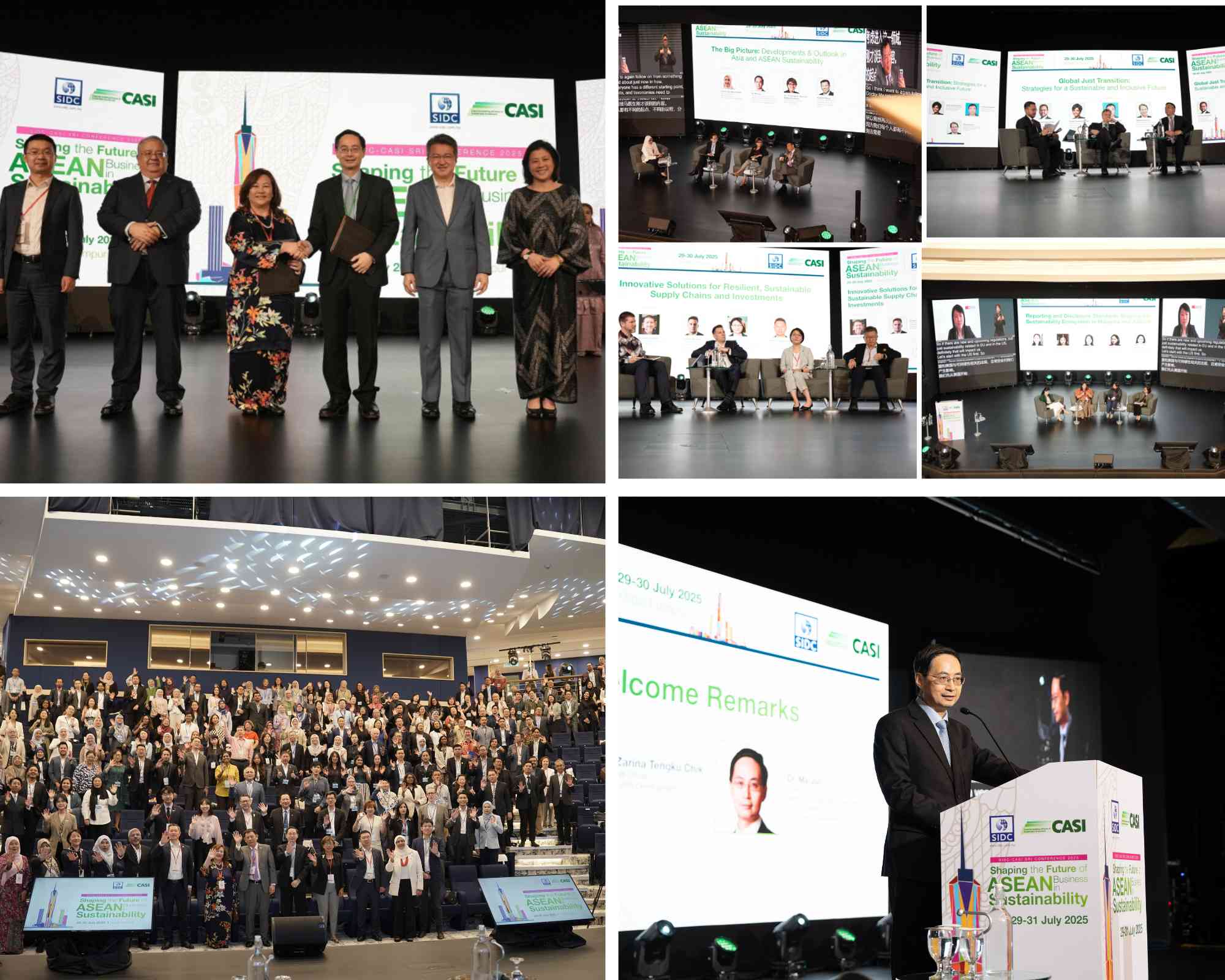
Kuala Lumpur, 1 August 2025 — The SIDC-CASI SRI Conference 2025, the sixth CASI Sustainability Forum, concluded successfully today after three days of dynamic dialogues, strategic partnerships, and immersive exchanges. Co-organized by the Securities Industry Development Corporation (SIDC) and the Capacity-building Alliance of Sustainable Investment (CASI), the event—held from 29 to 31 July 2025 at the Securities Commission Malaysia (SC)—underscored a shared commitment to advancing sustainable finance across ASEAN and emerging markets.
Over 300 delegates from ASEAN and beyond converged for the forum, themed “Shaping the Future of ASEAN Business in Sustainability”. Bringing together thought leaders, policymakers, financial and industry experts, the gathering aimed to accelerate progress in sustainable finance through actionable insights and cross-sector collaboration.
Participants engaged in robust discussions on pivotal topics reshaping the sustainable finance landscape, including: global and regional disclosure standards, development of integrated carbon markets, Islamic sustainable and responsible investment (SRI), harmonization of sustainability taxonomies, green skill development and capacity building, and financing for a “just transition” to low-carbon economies.
In opening remarks, Dr. Ma Jun, Chairman of CASI, highlighted a pressing challenge for emerging market and developing economies: the “bankability gap” of sustainable projects. He noted that up to 80% of such proposed “green” projects remain unfinanceable in the emerging markets due to insufficient early-stage support, calling for increased investment in pre-feasibility studies, policy support, innovative financial tools, and scalable solutions. Dr. Ma stressed the growing need for capacity building and urged family offices to explore impact investing and catalytic finance.
Dato’ Mohammad Faiz Azmi, Executive Chairman of the Securities Commission Malaysia (SC), stressed the importance of regional policy alignment and called on ASEAN stakeholders to adopt frameworks such as the ASEAN Taxonomy for Sustainable Finance and the ASEAN Transition Finance Guidance to facilitate cross-border green investments. He reaffirmed SC’s focus on regulatory innovation and capacity building for financial institutions, corporations, and SMEs adopting sustainability.
YB Liew Chin Tong, Malaysia’s Deputy Minister of Investment, Trade and Industry, called for bold, coordinated action to embed sustainability into national economic strategies. He urged ASEAN nations to collaborate in making sustainability a core pillar of long-term resilience and growth.
Tengku Zarina Tengku Chik, CE of SIDC, reaffirmed her organization’s commitment to cultivating talent and strengthening regional capacity in sustainable finance. She emphasized Malaysia’s ambition to emerge as a regional hub for sustainable investment development.
Panel discussions explored a range of emerging trends in sustainable finance, underscoring key priorities such as: developing interoperable sustainability taxonomies and digital disclosure systems; enhancing cross-border collaboration to scale green investments; supporting MSMEs through tailored financing and supply chain financing; and developing integrated carbon markets.
A key highlight of the forum was the signing of a Memorandum of Understanding (MoU) between CASI and SIDC, formalizing a long-term partnership focused on sustainable finance education and human capital development across ASEAN.
During the Forum, CASI Academy launched its enhanced online learning platform, featuring a 40-module curriculum (totaling 40 hours) delivered via engaging video lessons with animated avatars. The platform is available for free access for a limited two-week period starting today. CASI Academy also previewed its upcoming Competency Framework—set to underpin certification scheme to be launched later this year.
Reflecting on the forum’s outcomes, Dr. Ma Jun emphasized the urgency of climate action and coordinated approaches to build effective carbon markets. He summarized three priority areas identified by participants:
- Strengthening policy frameworks: Leveraging tools like sustainability labels, transparent disclosures, and blended finance to improve the bankability of early-stage low-carbon projects.
- Expanding financing instruments: Scaling loans, bonds, equity, and risk mitigation solutions—with a focus on underutilized transition finance.
- Empowering SMEs: Enhancing access to green finance via digital ESG data solutions, supply chain financing, and greater support from financial institutions and corporates.
Concluding the forum, Dr. Ma Jun announced two upcoming CASI events: a regional CASI forum in Hong Kong on 12 September 2025 (during Green Week) and the CASI Sustainability Forum in Brazil, to be held alongside COP30 this November.
For media inquiries, please contact:
Jessica Tsang
jessica.tsang@sprinkles.org.hk
____
About CASI
The Capacity-building Alliance of Sustainable Investment (CASI) is an international cooperation platform committed to delivering high-quality, high-impact sustainable finance capacity-building services for developing countries by serving as a global aggregator and distributor of sustainable finance knowledge. Officially launched at COP28 in December 2023, CASI has grown to include over 65 member institutions, including financial companies, industry associations, NGOs, service start-ups, and higher education institutions, with a geographic reach spanning Southeast Asia, Latin America, Africa, the Middle East, and other emerging markets. CASI supports the G20’s Transition Finance Framework (TAAP) by facilitating the exchange and dissemination of sustainable finance knowledge through various initiatives such as the CASI Sustainability Forum, CASI Seminar, CASI Technical Assistance (TA), and the CASI Academy—an online e-learning platform offering more than 40 modules on diverse topics related to sustainable finance. For more information about CASI and its members, please visit www.casi.net.
About SIDC
The Securities Industry Development Corporation (SIDC) is the learning and development arm of the Securities Commission Malaysia. SIDC is committed to building a competent, resilient, and inclusive capital market workforce through training, certification, and public-private collaboration.

